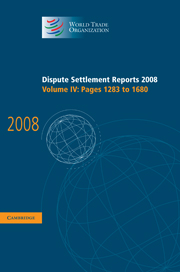Report of the Panel - Table of Annexes A to D-6
from United States – Subsidies on Upland Cotton – Recourse by Brazil to Article 21.5 of the Understanding on Rules and Procedures Governing the Settlement of Disputes (WT/DS267)
Published online by Cambridge University Press: 12 December 2017
Summary
ANNEX A-1
EXECUTIVE SUMMARY OF THE FIRST WRITTEN SUBMISSION OF BRAZIL
(Executive summary submitted on 24 November 2006)
1. This dispute results from the United States' failure to implement, in a timely and complete manner, the recommendations and rulings of the Dispute Settlement Body (“DSB”) in U.S. – Upland Cotton. Brazil challenges both the existence and consistency of U.S. measures taken to comply with the “adverse effects”- and “export credit guarantee”-related recommendations and rulings of the DSB.
Brazilian Claims Concerning Adverse Effects-Related Recommendations and Rulings of the DSB
2. In its adverse effects-related recommendations and rulings, the original panel, as affirmed by the Appellate Body, found that the price-contingent U.S. marketing loan program, counter-cyclical payment program and Step 2 program of the FSRI Act of 2002 caused significant price suppression in the world market for upland cotton, in violation of Articles 5(c) and 6.3(c) of the Agreement on Subsidies and Countervailing Measures (“SCM Agreement”). The panel found that “the United States is obliged to take action concerning its present statutory and regulatory framework as a result of our ‘present’ serious prejudice findings.” The Dispute Settlement Body adopted the panel and Appellate Body reports that obliged the United States to remove the adverse effects caused by the subsidies, or to withdraw the subsidies, by 21 September 2005.
3. The United States did not repeal or amend any of the three price contingent subsidy programs until 1 August 2006, when it finally discontinued solely the Step 2 program.
- Type
- Chapter
- Information
- Dispute Settlement Reports 2008 , pp. 1285 - 1680Publisher: Cambridge University PressPrint publication year: 2010

